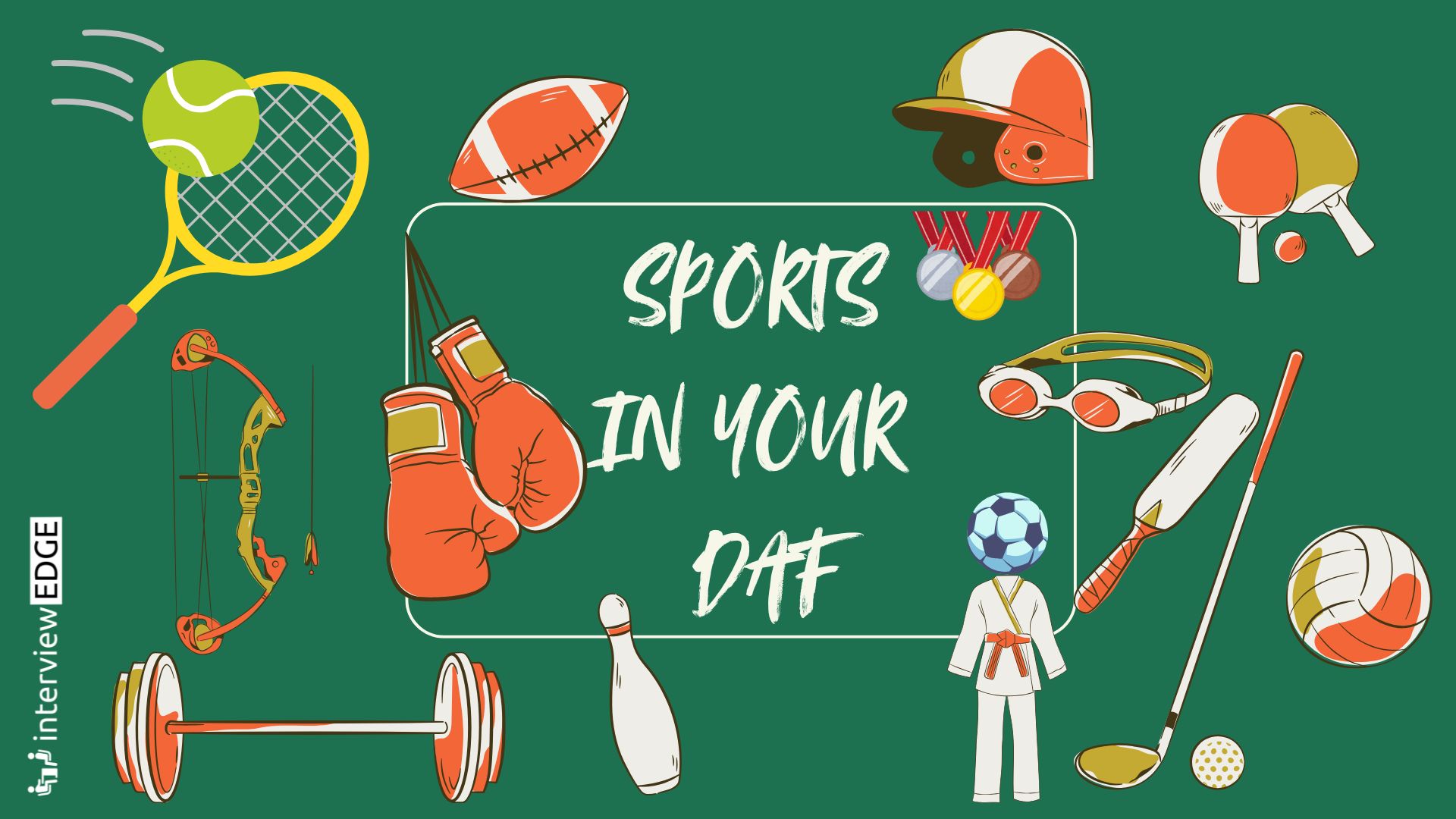 In our previous posts, we discussed how to handle UPSC interview questions related to topics like women’s issues, international relations, and places mentioned in your DAF. Today, we’ll be focusing on how to tackle questions related to sports—or any specific sport you’ve listed as your hobby. Every detail in your DAF can lead to questions in the interview, and sports are no exception. Whether it’s about your personal involvement, the rules of the game, or India’s sports achievements, the interviewers want to get a better sense of who you are and how deeply you understand your hobby. Here’s how you can handle these questions with confidence.
In our previous posts, we discussed how to handle UPSC interview questions related to topics like women’s issues, international relations, and places mentioned in your DAF. Today, we’ll be focusing on how to tackle questions related to sports—or any specific sport you’ve listed as your hobby. Every detail in your DAF can lead to questions in the interview, and sports are no exception. Whether it’s about your personal involvement, the rules of the game, or India’s sports achievements, the interviewers want to get a better sense of who you are and how deeply you understand your hobby. Here’s how you can handle these questions with confidence.
Explaining Your Interest in Sports
You must be prepared to explain why you chose sports as a hobby and what it means to you. Be genuine and specific about your involvement, what you have learned, and your level of participation. For example, if asked why football is your hobby, you could say, “I started playing football in school because it was a popular sport among my friends. Over time, I realized it not only keeps me physically fit but also sharpens my decision-making and teamwork skills. I still play occasionally to unwind and stay active.”
Learning the Basics and Technical Details
If you’ve mentioned a specific sport, you should be thorough about its basic rules, history, and technical terms. For example, know what a ‘deuce’ in tennis means, the history of cricket in India, or the rules of kabaddi. This shows sincerity and respect for your hobby. For instance, you could explain, “A deuce in tennis occurs when both players have scored 40 points, and the game is tied. From there, a player must win two consecutive points to secure the game.”
Highlighting India’s Achievements in Sports
Being aware of India’s achievements on global platforms can help you stand out in the interview. For instance, at the 2024 Paris Olympics, India secured six medals, including a silver and five bronze. One of the most celebrated achievements was Neeraj Chopra’s silver medal in javelin throw, continuing his streak of excellence. In weightlifting, Saikhom Mirabai Chanu remains a beacon of inspiration, with her previous silver at the Tokyo 2020 Olympics and strong performances at international events.
In chess, D. Gukesh made history in 2024 by becoming the youngest undisputed World Chess Champion at just 18 years old. If asked about your favorite Indian athlete, you could say, “My favorite athlete is D. Gukesh. His incredible achievement as the youngest World Chess Champion reflects his discipline and talent and showcases India’s growing prominence in global chess.”
Connecting Sports to Policies and Programs
Knowing about government policies and programs supporting sports is essential. For example, the Khelo India Program promotes grassroots sports participation by providing infrastructure and identifying young talent. The Target Olympic Podium Scheme (TOPS) focuses on preparing elite athletes for international competitions. You could explain, “The Khelo India Program has significantly contributed to India’s sports ecosystem by creating opportunities for young athletes and improving infrastructure at the grassroots level.”
The government’s emphasis on programs like the Fit India Movement encourages physical activity among citizens, while initiatives such as the National Sports Policy aim to enhance sports development in India.
Addressing Current Affairs and Challenges in Sports
Stay updated on sports-related news and issues. For instance, discussions on India’s performance at the 2024 Olympics highlighted challenges like limited infrastructure and administrative inefficiencies in sports federations. Be ready to discuss how India can address these challenges through public-private partnerships, transparent governance, and focused grassroots programs.
When asked about challenges in Indian sports, you might respond, “India’s sports sector faces hurdles like inadequate facilities, gender disparity, and administrative issues. Addressing these requires improved infrastructure, grassroots promotion through initiatives like Khelo India, and better accountability in sports bodies.”
Relating Sports to Life Skills and Administration
Sports impart valuable life skills like teamwork, leadership, and resilience—qualities crucial for a civil servant. For example, playing chess can enhance your strategic thinking and patience. When asked how chess contributes to administration, you could say, “Chess improves my problem-solving ability and decision-making skills. It teaches patience and foresight, which are vital for effective administration.”
Handling Tricky Questions
If you don’t know the answer to a question, admit it honestly but confidently. For instance, if asked, “Who won the men’s doubles gold in badminton at the 2024 Olympics?” you could say, “I am not sure about the winner, but I will look it up. However, I know India’s badminton players have consistently performed well in international tournaments.”
Final Thoughts
Be honest about your interests and achievements, stay updated on sports news and policies, and highlight the values and skills you’ve gained from your hobby. Mock interviews can help refine your responses. With the right preparation and approach, you can turn questions about sports into an opportunity to impress the panel. Use your hobby to showcase your personality, depth of knowledge, and potential as a civil servant.
